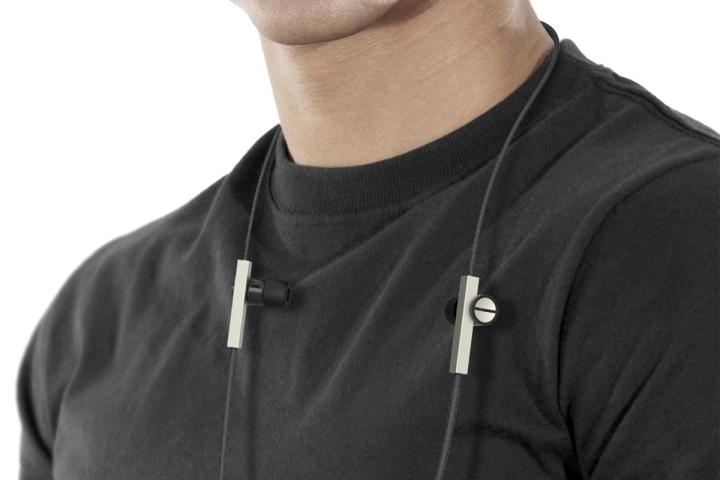
Related: Sennheiser puts Beats in the crosshairs with its new Urbanite headphones
Roam claims its Ropes earphones, which are currently only available for preorder, marry “audio fidelity with noise equalization in a sleek, attractive, wearable consumer accessory.” The ‘phones are designed in the likeness of a necklace or pendant so that the user doesn’t have to dig into a pocket or bag. The idea is, you simply wear the device around your neck and put the earpieces in when you want to listen. The headphones connect to your smartphone or tablet via Bluetooth, without the need to plug directly into the device.
It’s a serious gamble, on a seriously expensive pair of headphones. Essentially, Lamar’s new company is trying to convince users to not only change their own style choices to incorporate the neo-futuristic buds, but more to the point, to advertise their preference for a device with no brand recognition and zero history in the audio industry — at an enormous price point.
One of the reasons people (young people, especially) were so keen on flashing Beats gear was the coolness factor that came via the endorsement of a big name in music. In other words: Where is Roam’s Dr. Dre? If Lamar wants Ropes to fly off the shelves, he may just have to find one. However, apart from the unique style of its new device, the company seems to be relying on something often overlooked in the stylized headphone market these days: good engineering.
Though it doesn’t appear to be available for download/purchase on the iTunes or Google Play stores yet, an app called Roam EQ will allow Ropes users to personalize the sound of the headphones by employing a 5 band equalizer. Roam has implemented proprietary Noise Equalization technology which the company claims will deliver “the best sound quality on the market today.”
Related: How to master your EQ for the perfect sound
And perhaps most impressive, users can save their preferences using one device, and the headphones will remember the settings, taking the custom sound along for the ride to any device the Ropes connect to. Users can even share the preferences with a friend. The app will also come with various audio presets such as Jazz, Rock, Classical, Hip Hop, and Country.
It’s not exactly clear how the headphones remember the sound settings, other than their reliance on the pendant style chord to which they connect. The pendant design incorporates a small amplifier, digital signal processing, and the digital EQ info. Also on board is the battery for the ‘phones, which The Verge has reported as offering around 6 hours of playback. After that, the headphones will still work passively, but without the added amplification, or personalized sound signature.
It’s a cool idea, but again, a bit risky. The pendant dangles independently of the phone, but it’s still a long wire to hang down for Bluetooth-based headphones, adding extra weight to the equation.
Ropes will initially be available in just two colors, Graphite/Black or Graphite/Orange, though Roam claims it will introduce more color combinations sometime next year. The company plans to have Ropes, which will be on backorder until November 20, ready to ship for the 2014 holiday season.
Editors' Recommendations
- Deezer launches Sony 360 Reality Audio with a new stand-alone app
- Apple gives Beats Solo3 a fresh paint job, but no new features


